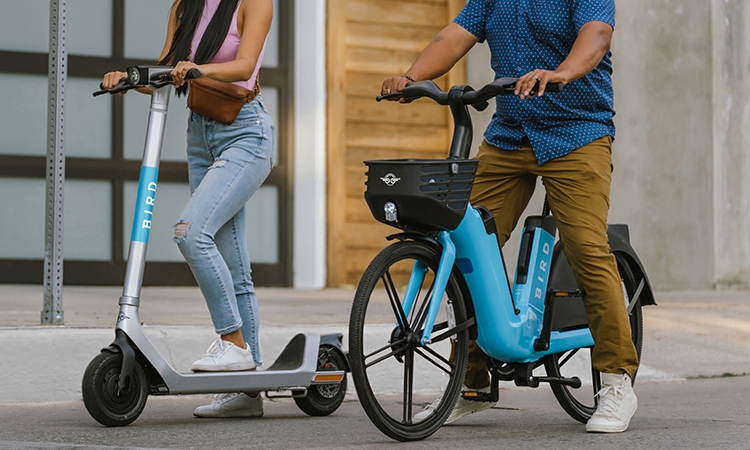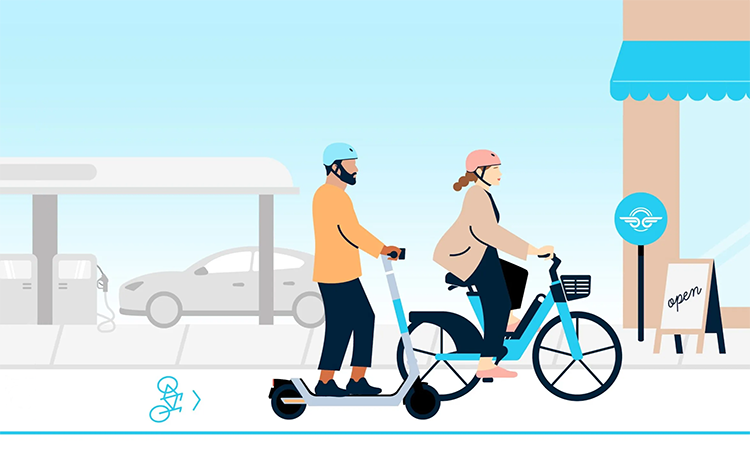How active and shared mobility is a win-win for cities by unlocking climate and economic benefits
- Like
- Digg
- Del
- Tumblr
- VKontakte
- Buffer
- Love This
- Odnoklassniki
- Meneame
- Blogger
- Amazon
- Yahoo Mail
- Gmail
- AOL
- Newsvine
- HackerNews
- Evernote
- MySpace
- Mail.ru
- Viadeo
- Line
- Comments
- Yummly
- SMS
- Viber
- Telegram
- Subscribe
- Skype
- Facebook Messenger
- Kakao
- LiveJournal
- Yammer
- Edgar
- Fintel
- Mix
- Instapaper
- Copy Link
Posted: 31 March 2022 | Yaniv Rivlin - Bird | No comments yet
Yaniv Rivlin – Senior Director, Head of EMEA Government Partnerships and Regional General Manager at Bird – highlights the benefits that electric micro-mobility can bring to cities beyond only tackling emission reduction targets and stresses the importance of the wider adoption of shared e-mobility.


Credit: Bird
Climate change is at ‘code red’ and the time to act is now. The latest Intergovernmental Panel on Climate Change (IPCC) Climate Report1 highlights the irrefutable influence of human activities in changing the climate and the urgency for immediate, effective solutions. The transportation industry is one of the largest contributors to greenhouse gas (GHG) emissions, accounting for 30 per cent of total GHG emissions across the globe. Yet, cities across the world often overlook a generally free-to-set-up transportation alternative that can help them to achieve their climate action goals and boost local economies: electric micro‑mobility.
Shared micro-electric vehicle programmes have the potential to transform the course of climate change while increasing spending at local businesses
Shared micro-electric vehicle programmes have the potential to transform the course of climate change while increasing spending at local businesses. Residents and visitors to cities and towns of any size should, and can, have access to affordable, sustainable transportation solutions to meet these goals and, ultimately, build a better community for all. Let’s take a closer look at some of the benefits of shared e-mobility.
A positive environmental impact
By choosing micro-electric over gas-powered vehicles, Bird riders have contributed to the fight against climate change, whether they realise it or not. For instance, in 2021, riders saved an estimated 1,125,000 gallons of petrol2 by riding our fleet of shared e-scooters and e-bikes in 350 cities globally. These savings equate to as much as 10,000 metric tonnes of CO2 prevented from entering the atmosphere.
Benefiting the local economy
It doesn’t stop there. Choosing shared micro-electric vehicles doesn’t just provide environmental benefits – it’s also a huge boost for local economies and small businesses, especially as cities throughout the world continue their economic recoveries. A recent study3 from Emory University’s Goizueta Business School indicates that e-mobility programmes spur economic activity and generate spending in the cities where they operate. The report estimates that over $1,000 in spending resulted from each e-scooter that was deployed in cities, predominantly across local food and beverage companies. Globally, in 2021, $100 million was spent by Bird riders at local shops and restaurants throughout partner cities around the world.
“Cities benefit greatly from these programmes, making it a win-win for all parties involved,” said Assistant Professor of Marketing, Daniel McCarthy, who co-authored the study with Emory University PhD student, Kyeongbin Kim. “The economic boost to local businesses, compounded by environmental benefits, should drive cities to partner with Bird, or any other e-mobility operator, to advance a community that works for businesses and customers.”
A more-connected community is a thriving community – one where residents and visitors alike can move around cities, shop at local businesses and experience mobility freedom without being bogged down by excessive traffic and sky-high prices from ride-hail providers.
Bird’s positive economic impact is also being seen and felt in partner cities across the world. The availability of shared e-scooters and e-bikes in 2021 added significant local economic impact and increased incremental spending to the tune of millions of euros in the following cities:
- Marseilles, France: €1.6 million
- Rome, Italy: €2.6 million
- Madrid, Spain: €1.8 million
- Berlin, Germany: €3 million
- Lisbon, Portugal: €1.3 million.


Credit: Bird – Bird riders across the globe saved an estimated 1,125,000 gallons of petrol and spent $100 million at local shops and restaurants over the course of 2021.
Wider shared mobility adoption
The eco-friendly economic engines and impact proves that investing in shared e-mobility programmes provide a huge return. It’s time for cities, both big and small, to accelerate the number of e-scooters and e-bikes on Europe’s streets, to continue spurring local economic growth while having a positive impact on the environment and public health.
Major cities across the globe are proving what’s possible when policy embraces the widespread benefits of e-mobility instead of expensive, emission-emitting vehicles. A recent FastCompany article4 reported that, over the last few years, Oslo, Norway, has removed hundreds of parking spaces and simultaneously built a stronger bike-share network to improve access to public transit and encourage residents and visitors alike to take more eco-friendly transportation options. As a direct result, the city saw 43 per cent more people walking in downtown areas – which, in turn, spurred additional spending for businesses. Paris is following suit, with an ambitious plan to stop cars from driving across four central districts. Car-free zones unlock potential for cities to bring together their communities and provide safe streets for riders to visit businesses to boost local economies.
Maximising the benefits
Cities can take a three-pronged approach to maximising the economic and environmental benefits of micro-electric vehicle programmes:
Loosen restrictions for fleet caps
Cities that are already partnered with e-mobility operators should increase the maximum number of e-scooters and e-bikes allowed in a city and let demand drive the supply. Current limits on fleet caps do not allow cities to reap the maximum benefits of e-mobility vehicles on their streets. Riders are more likely to visit and shop at local businesses if they have easy modes of transportation that are both quick and convenient. Cities should consider loosening restrictions in order to maximise the economic and environmental benefits possible.
Let demand drive supply
Demand for personal e-mobility transit options to move around cities is at an all-time high, with no signs of slowing down. In fact, according to Bloomberg5, e-bike sales outpaced electric cars and hybrid sales in 2021. Yet, the demand is not always reflected in the number of e-scooters or operators available in cities. City officials should not let artificial barriers delegate how many people gain access to these vehicles. Instead, they should monitor usage and prioritise demand, not arbitrary regulations, to shape the supply of e-scooters and e-bikes on its streets.
Allow for better co-ordination between local businesses and shared micro-mobility operators
Cities should encourage local shops and restaurants to partner with e-mobility operators to attract riders to visit their businesses via eco-friendly transit options. Through incentives or public-private partnerships, cities can serve as intermediaries to catalyse a more attractive relationship between their local businesses and its operators. For instance, one promotion could offer riders a five per cent discount to local shops and restaurants if they arrive by e-scooter or e-bike – boosting both revenue and rides.
It’s only a matter of time before cities across the world realise the significant economic and environmental benefits that e-mobility programmes provide to their local communities and the world. E-scooters and e-bikes provide more than just a fun, affordable way to reach your destination, but opportunities for cities to build a more connected community, while supporting climate goals and supporting the local economy. The future of cities is here – now is the time to unlock the potential for e-mobility as the next generation solution of transportation.
References
- https://www.un.org/press/en/2021/sgsm20847.doc.htm
- https://www.bird.co/blog/bird-riders-spent-100m-cities-saved-1m-gallons-gas-2021/
- https://papers.ssrn.com/sol3/papers.cfm?abstract_id=3802082
- https://www.fastcompany.com/90456075/here-are-11-more-neighborhoods-that-have-joined-the-car-free-revolution
- https://www.bloomberg.com/news/articles/2022-01-21/u-s-e-bike-sales-outpaced-electric-cars-in-2021
Yaniv Rivlin is Bird’s Regional General Manager in Israel and a Senior Director in the global company, where he also runs the EMEA Government Partnerships department. Rivlin is responsible for leading the successful adoption of Bird in Israel, which has been acknowledged globally.
Related topics
Air Quality, Alternative Power, Mobility Services, On-Demand Transport, Passenger Experience, Sustainable Urban Transport, Transport Governance & Policy
Issue
Issue 1 2022
Related modes
Bikes & Scooters
Related organisations
Bird, Bloomberg, Emory University, FastCompany, Intergovernmental Panel on Climate Change (IPCC)
Related people
Daniel McCarthy, Kyeongbin Kim, Yaniv Rivlin








